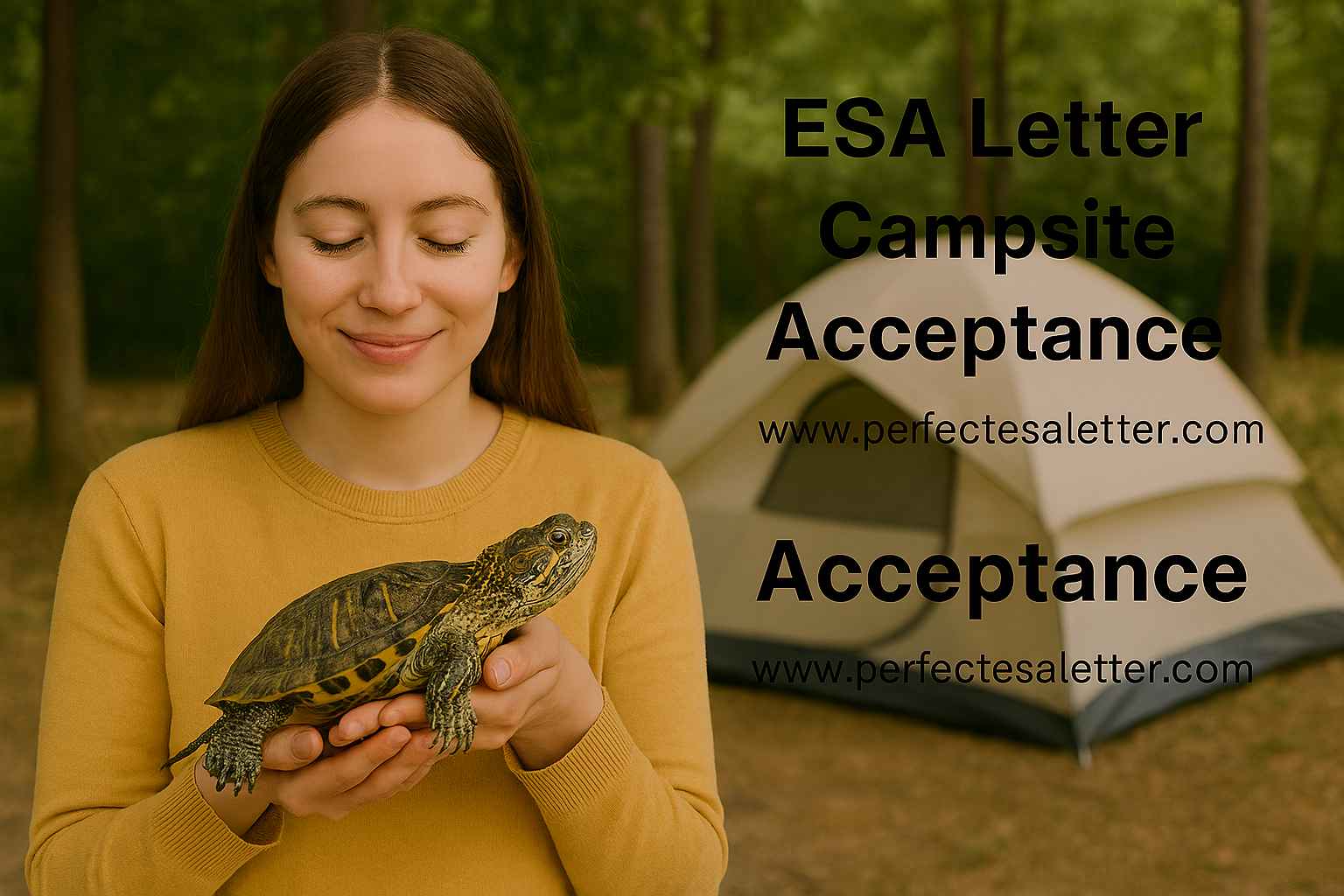ESA Letter for Campsite Acceptance: Enjoy Outdoor Stays with Your Emotional Support Animal
Article
Introduction
Camping is a popular way to reconnect with nature, reduce stress, and unwind. For people with Emotional Support Animals (ESAs), camping offers companionship and comfort. However, many campsites and campgrounds have strict no-pet rules or charge extra fees for animals.
A valid ESA letter allows campers to legally bring their ESA to qualifying campsites, protecting them from discrimination and ensuring a smooth outdoor experience.
This article explains how ESA letters apply to campsite acceptance, the laws that protect ESA owners, and tips for camping responsibly.
”Get Yours Now!
Don’t wait until a landlord or airline tells you “no pets allowed.” Protect your rights today.
Please fill out this form and our team wil contact you ASAP.
Complete your assessment in minutes , get approved by a licensed professional, and receive your letter within 24 hours.
Why ESA Letters Matter for Campsites
Even though camping is typically temporary, some campsites function as residential or long-term outdoor housing, especially in RV-friendly or seasonal parks. Common issues for ESA owners include:
- No-pet policies.
- Extra fees or deposits.
- Restrictions on size or breed.
A valid ESA letter:
- Confirms your ESA is medically necessary.
- Overrides no-pet rules in FHA-covered campgrounds.
- Prevents illegal charges for your ESA.
Legal Protections for ESA Camping
- Fair Housing Act (FHA)
- Covers campgrounds or RV campsites used as long-term residential housing.
- Requires reasonable accommodation for ESA owners.
- HUD (U.S. Department of Housing and Urban Development)
- Ensures ESA protections are enforced in qualifying outdoor housing.
- ADA (Americans with Disabilities Act)
- Usually applies to public access areas, like park facilities, rather than residential camping.
👉 Key Note: Short-term recreational camping may not be protected, but seasonal or long-term campsite rentals often qualify.
What Makes an ESA Letter Valid for Campsites
To be accepted at a campsite, your ESA letter must:
- Be issued by a licensed mental health professional (LMHP).
- Be on official letterhead, signed, and dated.
- Include the provider’s license and contact information.
- State that the ESA is necessary for your emotional or mental health.
❌ Fake or generic letters are often rejected by campsite management. Always use a verified provider.
How to Get ESA Letter Approval for Campsites
- Obtain a Licensed ESA Letter
- Consult a therapist, counselor, or psychiatrist.
- Identify Campsites That Allow ESA Accommodation
- Check for long-term or seasonal camping regulations.
- Submit Your ESA Letter to the Campground Office
- Provide documentation before arrival to avoid conflicts.
- Explain Your ESA’s Role
- Clarify that it is medically necessary and not a regular pet.
- Await Approval
- Management must process ESA requests reasonably under FHA regulations.
What Campsite Management Can & Cannot Do
✅ Allowed:
- Verify your ESA letter.
- Hold you responsible for any damage caused by your ESA.
- Request proper control and behavior of the ESA.
❌ Not Allowed:
- Deny your ESA solely due to pet restrictions.
- Charge pet fees or deposits for your ESA.
- Deny based on breed, size, or weight.
Common Challenges for ESA Owners
- Short-Term Camping Exclusions
- FHA protections mainly apply to long-term stays.
- Management Unawareness
- Many campsites are unfamiliar with ESA laws.
- Other Campers’ Allergies or Fears
- Reasonable accommodations may be required, such as designated areas.
- Behavior Issues
- ESA must behave responsibly; disruptive animals may face restrictions.
Tips for Camping with an ESA
- Keep Documentation Accessible – Carry a copy of your ESA letter.
- Train Your ESA – Minimize barking, digging, or disruptive behavior.
- Respect Shared Spaces – Clean up after your ESA and maintain campsite etiquette.
- Communicate Early – Notify campground management before arrival.
- Stay Responsible – You are liable for damages caused by your ESA.
Real-Life Example
Emma, who suffers from severe anxiety, planned a month-long seasonal camping trip in a lake-side RV park. The park initially enforced a strict no-dog policy. Emma submitted her ESA letter from her licensed psychologist.
The management reviewed FHA guidelines and approved her dog, allowing her to enjoy the campsite without fear of discrimination or extra charges. Her ESA helped manage her anxiety while providing companionship during the long stay.
FAQs
Q1: Can campsites deny my ESA?
👉 Only if the ESA poses a direct threat or creates a significant administrative burden.
Q2: Do I need to renew my ESA letter?
👉 Yes, most facilities require updated letters for ongoing stays.
Q3: Are ESA rights guaranteed at short-term campsites?
👉 Not always. ESA protections are strongest for long-term or residential stays.
Q4: Can campsites charge pet fees for ESAs?
👉 No. Fees or deposits for ESAs are prohibited under FHA.
Q5: Can breed or size restrictions apply to my ESA?
👉 No. FHA protections apply regardless of size or breed.
Conclusion
An ESA letter for campsite acceptance ensures that your emotional support animal is legally protected, even in outdoor housing environments. While short-term camping may not always be covered, long-term or seasonal sites that qualify as residential housing must accommodate ESAs.
With a valid ESA letter, responsible ownership, and clear communication, you can enjoy the outdoors while maintaining your mental health support.
👉 Your ESA is not just a companion—it’s an essential part of your well-being, even in nature. Proper documentation ensures they can stay with you wherever you camp.
”Get Yours Now!
Don’t wait until a landlord or airline tells you “no pets allowed.” Protect your rights today.
Please fill out this form and our team wil contact you ASAP.
Complete your assessment in minutes , get approved by a licensed professional, and receive your letter within 24 hours.

